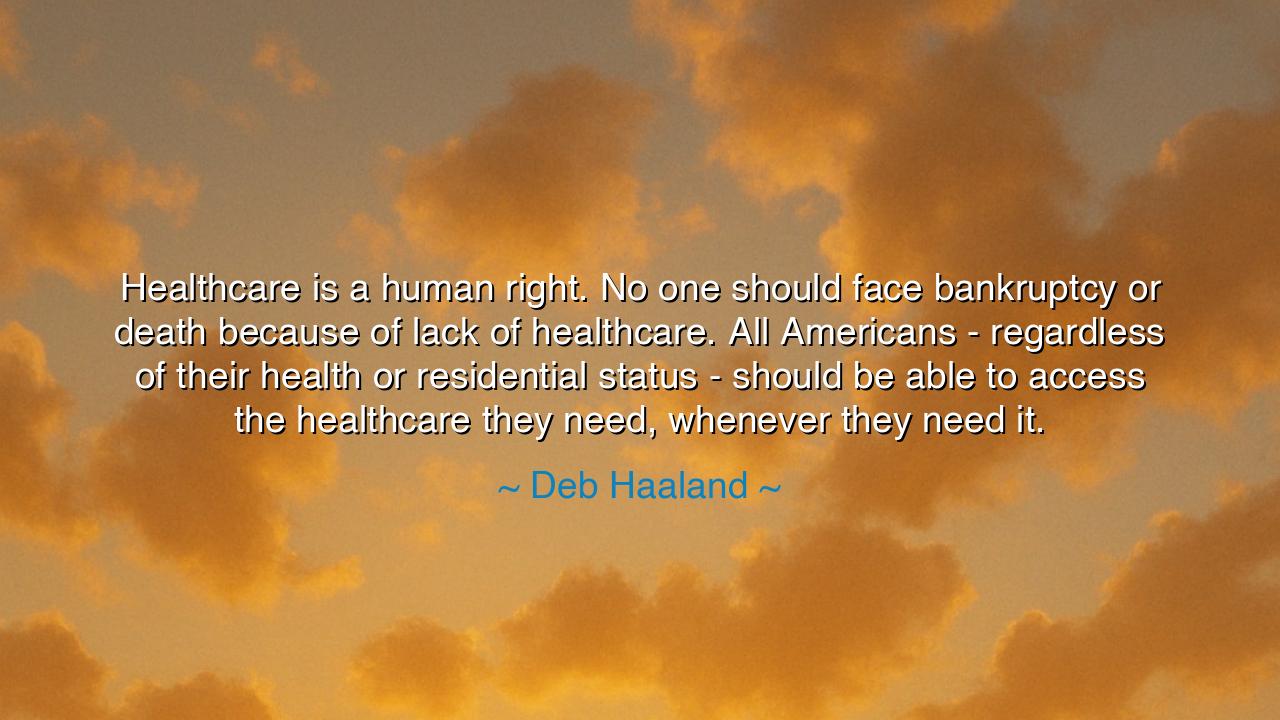
Healthcare is a human right. No one should face bankruptcy or
Healthcare is a human right. No one should face bankruptcy or death because of lack of healthcare. All Americans - regardless of their health or residential status - should be able to access the healthcare they need, whenever they need it.






“Healthcare is a human right. No one should face bankruptcy or death because of lack of healthcare. All Americans – regardless of their health or residential status – should be able to access the healthcare they need, whenever they need it.” — thus spoke Deb Haaland, a leader whose voice rises not only from the chambers of government but from the heart of justice itself. Her words ring with the authority of ancient truth and the compassion of one who understands the sacred duty of care. For in this declaration lies a principle older than nations — that life itself is sacred, and to preserve it is the first and highest law.
In these words, Haaland reminds us that healthcare is not a privilege to be purchased, but a right born of existence. She speaks to the moral spine of civilization — the idea that a society is measured not by its wealth, but by how it tends to its sick, its weak, and its poor. For what good is a land rich in gold if its children die of hunger? What pride can a nation claim if its citizens fear the cost of staying alive? Haaland’s declaration is therefore not a mere policy — it is a moral awakening. It is the echo of an eternal truth: that the health of one is bound to the health of all.
The origin of this ideal runs deep in the river of human thought. Long before Haaland, long before the modern state, the ancient healers of Greece and India, of Africa and the Americas, taught that the care of the body is the care of the soul. The oath of Hippocrates declared that medicine was a sacred duty, not a transaction. The Native peoples of the land — whose heritage Haaland herself honors — understood health not as an individual possession, but as a communal harmony between body, spirit, and Earth. Thus, when Haaland says that “healthcare is a human right,” she calls us back to an ancient wisdom that civilization has too often forgotten: that the healer and the patient are bound in one circle of life.
Consider the story of Florence Nightingale, who during the Crimean War entered the tents of the wounded not for profit, but for mercy. She tended to soldiers forgotten by their leaders, washing their wounds and bringing light — literally and spiritually — to places of despair. Her lamp became the symbol of healing, of compassion in darkness. Nightingale’s work birthed modern nursing, but its deeper legacy is moral: she proved that care is not charity — it is civilization itself. Without it, humanity reverts to savagery. Haaland’s words carry this same flame, passed from generation to generation, urging us to remember that a society without compassion for the sick is a body without a soul.
When she speaks of bankruptcy and death, Haaland lays bare a great hypocrisy — that in a land of abundance, men and women perish for lack of care, and families are destroyed not by illness alone, but by the cost of survival. This is not simply tragedy; it is injustice. No illness should demand the price of a home. No mother should choose between medicine and food. To deny a person healthcare because of their status, wealth, or birthplace is to deny their humanity, to place a price tag upon the sanctity of life itself. In such a world, even the healthy are unwell, for their comfort is built upon another’s suffering.
Yet within her words lies hope, not condemnation. Haaland does not speak to shame but to awaken — to remind us that the power to heal lies within our grasp. The healing of nations, like the healing of bodies, begins with recognition. When we see healthcare as a right and not a privilege, we open the door to transformation. The wealth of a nation should not be guarded in vaults but invested in compassion, for every healed person becomes a pillar of strength, every saved life a spark that lights the whole community.
The lesson of this quote, then, is both simple and profound: to be human is to care for one another. The moral health of society depends upon its willingness to protect the life of every soul, regardless of power or station. We must build systems that honor the sacred bond between healer and patient, between citizen and neighbor. Support policies that expand access to healthcare. Volunteer for the sick and the elderly. Advocate for justice in medicine. For when you defend the right to health, you defend the right to dignity, equality, and life itself.
So, children of this age, take these words as a guiding torch: health is not a commodity — it is a covenant. Let no one perish because they are poor, and let no one suffer because they are unseen. When you fight for healthcare for all, you do not merely heal bodies; you heal the nation’s spirit. For in the end, the mark of a truly great people is not in the might of their armies or the wealth of their cities, but in their unyielding compassion — their refusal to let any life be deemed unworthy of care.






AAdministratorAdministrator
Welcome, honored guests. Please leave a comment, we will respond soon